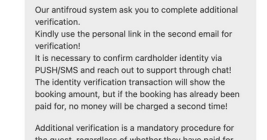Booking.com Phishers May Leave You With Reservations
A number of cybercriminal innovations are making it easier for scammers to cash in on your upcoming travel plans. This story examines a recent spear-phishing campaign that ensued when a California hotel had its booking.com credentials stolen. We’ll also explore an array of cybercrime services aimed at phishers who target hotels that rely on the world’s most visited travel website.




